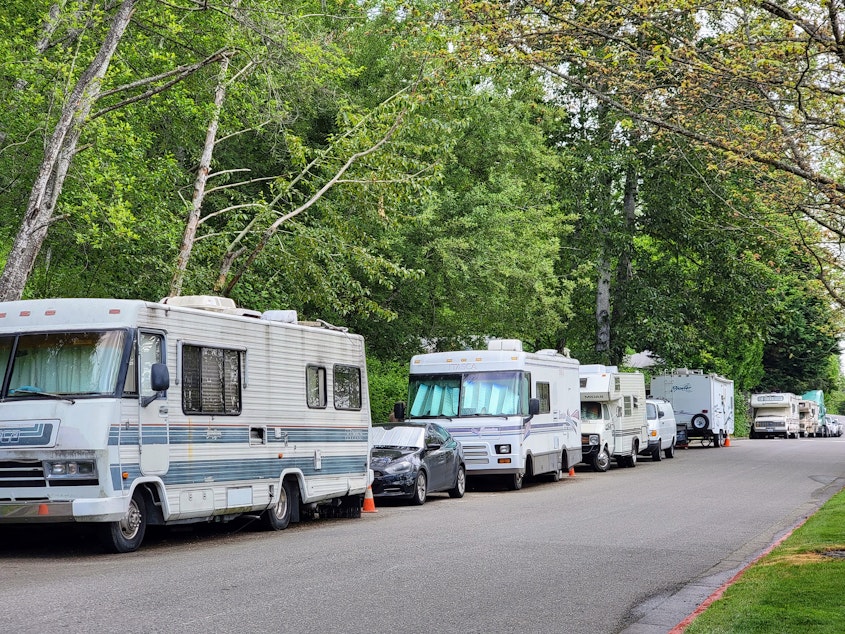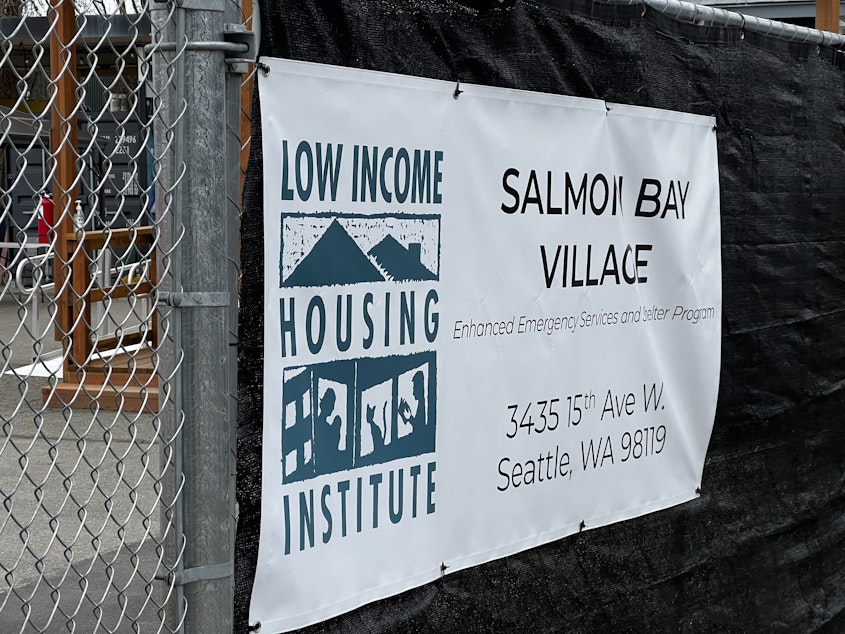Safe parking lots are trending, but can the Seattle area meet the need?

Safe parking programs have gained traction in recent years – there are now about a dozen lots available across the state, many sponsored by churches.
They’re responding to an often invisible problem: people who sleep in their vehicles, with nowhere to legally park and no access a restroom. But identifying the need — and ramping up services — are two different challenges.
After a year of searching, Bellevue has finally found an operator for a safe parking pilot program for people who live in their cars on the Eastside. The lot will be the first program of its kind in the city. It’s located on a property east of City Hall next to the 405 freeway and is approved for up to 20 cars and RVs.
"The last formal count that took place found hundreds of vehicles and people living in their vehicles throughout the Eastside," said Nico Quijano, the homelessness outreach program manager for the City of Bellevue. "When we talked to another local organization, and we told them the numbers that we came up with, they said that's definitely an undercount."
In Bellevue — despite having funding and a location secured — the city struggled for months to find an operator able and willing to sign on and run the site, staff its day center, and connect people to health care, employment and housing.
In February, East King County-based nonprofit 4 Tomorrow agreed to step in.
"Now, this will be a slow rolling process, because there is an intake and referral process," said Monik Martinez, the executive director at 4 Tomorrow. "We'll be working up to that 20 [vehicle] number, and there is the possibility for RVs. We're not going to start there, we definitely want to just make sure that we can manage the program and really get in the swing of things before we open it up for that."
4 Tomorrow provides case management services for housing stability, including eviction prevention work through financial assistance programs, and free mental health services. City staff currently send service referrals to 4 Tomorrow, and Martinez said that relationship is what helped them decide to join the safe parking program, which will build on their existing services with the goal of moving people out of vehicles and into stable housing.
They hope to open the lot in early spring and will operate though 2024, with the opportunity to extend into 2025.
RELATED: A safe parking lot in Bellevue took a year to set up, which may be longer than it lasts
"Ultimately, we would like everyone to have their basic needs met," Martinez said. "So that includes, ultimately, permanent housing or transitional housing, and stable housing at the end of the program for them."

A roadmap to success?
City and county sponsored safe parking programs have had an uneven history in Western Washington. Seattle had publicly sponsored lots open in 2016 and 2018 that hosted vehicles in Ballard and SODO, but issues with the property in Ballard and safety concerns in SODO ultimately closed those down. A handful of smaller sites, like one at the University Heights Center, currently offer overnight spots for cars (and not RVs).
More recently, Pierce County's pilot program that works primarily with local churches has been such a success that it has expanded to five sites.
RELATED: Pierce, King counties announce new safe parking lot programs for RVs and other vehicles
Today the organization known for tiny home villages, the Low Income Housing Institute (LIHI), is taking another crack at a 24-hour safe parking lot in Seattle, with $1.9 million from the King County Regional Homelessness Authority.
The group opened Seattle's first lot specifically designed for our RVs, called Salmon Bay Village, in December, but the search for a suitable space was announced in 2022.
"There are a lot of environmental factors," said Jon Grant, LIHI's chief strategy officer, on a recent tour of the site. "It's about finding a spot that can actually fit that many RVs. For us, finding an owner or private owner that was willing to go out on the limb and do this strange project, from their point of view, was probably one of the biggest challenges."
Grant said the lot has been open for eight weeks and served 17 people, with 35 RVs currently waiting to be moved in. The purpose of the lot is to transition people living in their vehicles to stable housing, including nine tiny homes also on the Salmon Bay lot. Once moved out, RVs in bad condition are typically demolished.
RELATED: Would you build a tiny home in your backyard for a homeless person?
In addition to tiny homes, the lot has its own electrical grid to make RV power safer, a kitchen and dining area, service tents, and a security booth with a locked gate. The lot is owned by a Seattle Storm co-owner and is leased to LIHI for five years.
"We don't think of it as a parking lot, we think of it as a housing program," Grant said. "This is sometimes the first time that folks have been able to gain access to a substance use counselor, a mental health counselor. We have somebody who actually works on site that works for therapeutic health services, which is a certified behavioral health provider. And they're right here, and they can knock on your door and have a conversation and help get you into treatment."
Listen to the full "Soundside" segment by clicking the play icon at the top of this story.





